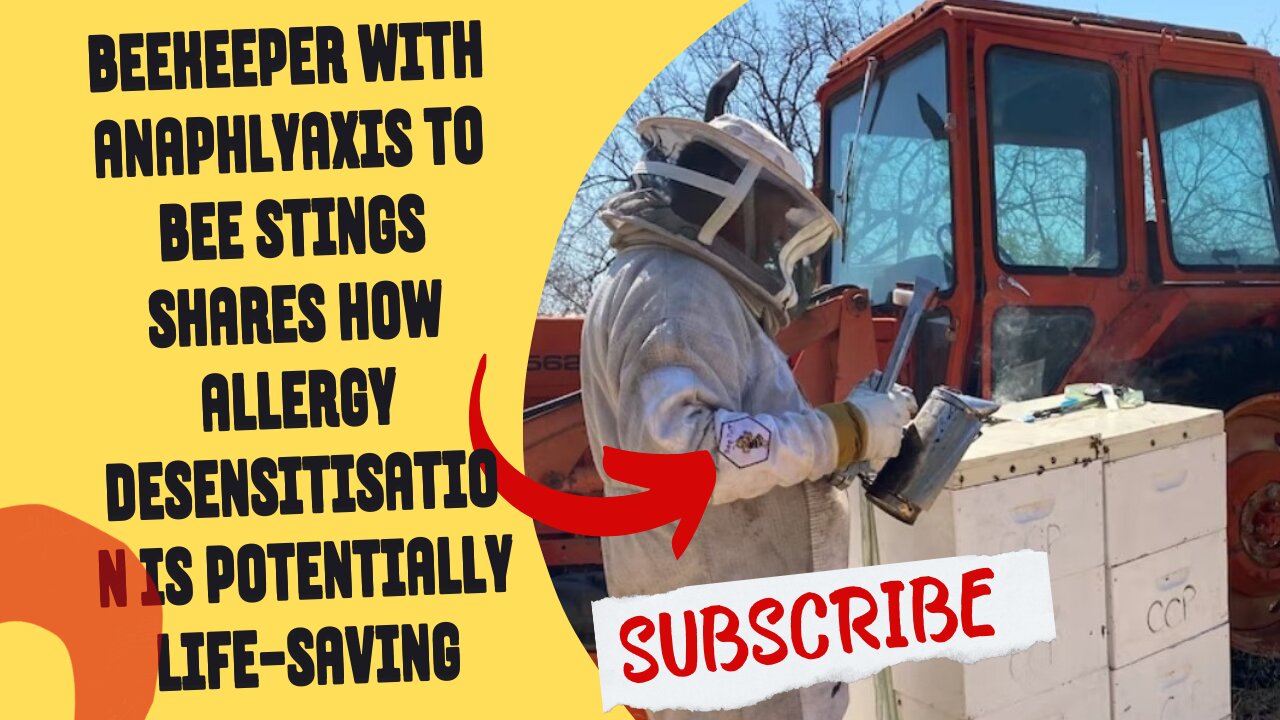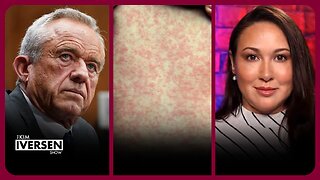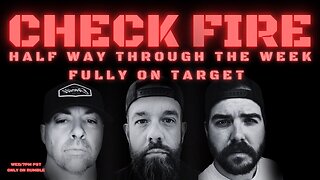Premium Only Content

Beekeeper with anaphlyaxis to bee stings shares how allergy desensitisation
Beekeeper with anaphlyaxis to bee stings shares how allergy desensitisation is potentially life-saving
Beekeeper Ian Cass had been in the middle of performing his usual duties when he suddenly collapsed and almost died from a bee sting.
Key points:
A beekeeper who developed anaphylaxis to bee stings has overcome his condition
Ian Cass underwent rapid desensitisation and is injected with bee venom every five weeks
The process is recommended by allergy experts for people who are at risk
His sudden anaphylaxis had been a shock on multiple counts — he had worked with bees for two years without incident.
"I'd been working some bees on canola and about 20 minutes after a sting, I got hot … so I headed back to the car to pull my bee suit off," he said.
"I woke up on the ground, I don't know how long later, tried to get to my feet, crashed to the ground a second time and then managed to crawl to the car to call my wife.
"When she got there, she realised I'd broken my tibia, fibula, dislocated my ankle and permanently destroyed a couple of tendons in the process."
He had no idea he was experiencing an anaphylactic reaction.
It would take another sting — and another close call — three months later for the Riverland man to get an official diagnosis.
For the previous two years, whenever Mr Cass was stung, he "just flicked the stings out and kept going".
The former dryland farmer had turned to beekeeping in 2018 after a severe car accident left him unable to operate heavy machinery.
Determined not to give up his beekeeping, Mr Cass sought urgent action to protect his career and passion.
A solution to the sting
Once diagnosed, the regional beekeeper discovered desensitisation as a way to stop him from putting his life at risk in his line of work every day.
Also known as allergen immunotherapy, the process involves the regular administration of allergen extracts, such as bee venom, into the human body over a number of years.
Mr Cass was referred to a rapid desensitisation program at the Royal Adelaide Hospital and was injected with small doses of bee venom in a controlled environment over the course of two days.
"The first dose might be one-hundredth of a sting and then they go up to a fiftieth of a sting and they slowly build you up to retrain your body," he said.
The injections moved to weekly and then monthly, before Mr Cass settled into his now regular routine of receiving a shot of bee venom from his local GP once every five weeks.
"As long as I'm beekeeping I'll need to keep getting the venom injected," he said.
Long-term success
A recent study from the United States found venom immunotherapy was effective on about 75 to 85 per cent of honeybee allergies.
Allergist professor Peter Smith said allergen immunotherapy had been used on Australian patients for more than a century and had a good success rate locally.
Professor Smith, from Queensland Allergy Services, said allergens created protective antibodies, which migrated to places in the body under threat, including the eyes, nose and lungs.
"When the allergens come in, the [antibodies] act like a molecular sponge and neutralise the allergen," Professor Smith said.
It gets chewed up and the tissue heals, making it more resilient to these potential allergen threats.
"The longer you do it, the more likely the molecular sponge is going to work."
Professor Smith said the treatment was effective in protecting against a range of allergies, including dust mites and grasses.
"About half the patients [who go through immunotherapy] can stop their medication and the other half can reduce the amount they need," he said.
"Always see someone who is a trained specialist to help your [individual] situation."
Bee therapy ineffective against wasps
Despite successfully receiving treatment for his bee-sting allergy for the past three years, Mr Cass learnt just last month that his regular injections were ineffective against wasp stings.
The beekeeper had been driving home on September 14 after being stung by a European wasp when he had to pull over and lie on the ground until an ambulance arrived.
"I didn't get to the point of full anaphylaxis … but it still scared me pretty badly," Mr Cass said.
"I didn't realise I was anaphylactic to wasps as well, so it was a bit of a shock to the system.
-
 3:03:35
3:03:35
TimcastIRL
9 hours agoTrump Just FIRED OVER 6,700 IRS Agents In PURGE, Democrats SOMEHOW Angry w/Chloe Cole | Timcast IRL
185K247 -
 1:39:48
1:39:48
Kim Iversen
12 hours agoThe Measles Fear Hoax: How They’re Using an Outbreak to Smear RFK Jr.
105K82 -
 1:18:19
1:18:19
Glenn Greenwald
11 hours agoRumble & Truth Social Sue Brazil’s Chief Censor Moraes in US Court; DC Establishment Melts Down Over Trump's Ukraine Policy | SYSTEM UPDATE #409
122K117 -
 1:33:39
1:33:39
Redacted News
13 hours agoBREAKING! Europe goes NUCLEAR against Trump over pushing for PEACE in Ukraine | Redacted
195K232 -
 1:00:43
1:00:43
The StoneZONE with Roger Stone
10 hours agoRoger Stone Destroys Mike Pence for Attacks on Trump | The StoneZONE
129K50 -
 1:05:43
1:05:43
Flyover Conservatives
1 day agoFederal Reserve on the Chopping Block—Trump’s Boldest Move Yet! - Floyd Brown, Western Journal | FOC Show
71.5K7 -
 2:50:40
2:50:40
Melonie Mac
15 hours agoGo Boom Live Ep 38!
72K4 -
 11:08
11:08
China Uncensored
13 hours agoXi Jinping's Greatest Fear
40.6K14 -
 2:11:20
2:11:20
I_Came_With_Fire_Podcast
18 hours agoFar Left TROJAN HORSE | SPECIAL Forces in MEXICO | GERMANY under FIRE
32.3K13 -
 1:41:00
1:41:00
Darkhorse Podcast
16 hours agoIf Only We’d Known: The 265th Evolutionary Lens with Bret Weinstein and Heather Heying
177K40